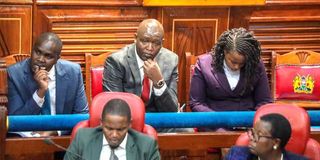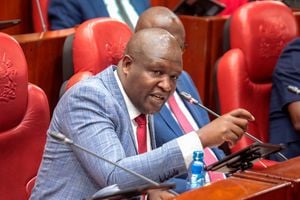
Kericho Governor Erick Mutai before the Senate over his impeachment by MCAs.
More than five hours filled with tension, less than five minutes of voting and divided senators was all it took to save embattled Kericho Governor Erick Mutai the ignominy of being removed from office just two years into his tenure.
A preliminary objection by Dr Mutai’s counsel, Katwa Kigen, on whether the county assembly met the two-thirds threshold required to remove a governor from office by impeachment saved the day, cutting short a planned two-day impeachment trial.
With the clock ticking towards 5pm, senators were invited to make a decision on whether the impeachment proceedings would continue or would be terminated on the basis of the two-thirds threshold having not been met by the assembly.
Racing against time, Senate Deputy Majority Leader Tabitha Karanja from Nakuru moved a motion, seconded by Minority Leader Stewart Madzayo, to uphold the preliminary objection and forthwith terminate the proceedings against Dr Mutai.
Reading the mood of the House, Speaker Amason Kingi invited the senators to vote on the objection, saying support from at least 24 county delegations was needed to terminate the proceedings.
Sitting pensively with the sword of Damocles hanging ominously over his head, 34 against 10 senators voted to uphold the objection, giving Dr Mutai a political lifeline.
“The motion having been approved, the hearing proceedings on the proposed removal from office by impeachment of Kericho Governor Erick Mutai terminates…,” said Mr Kingi, as Dr Mutai crossed his hands across his chest.
Votes by Aaron Cheruiyot (Kericho), Samson Cherargei (Nandi), Boy Issa Juma (Kwale), Madzayo (Kilifi), Okong’o Omogeni (Nyamira), Oburu Oginga (Siaya), Tom Ojienda (Kisumu), Ledama Olekina (Narok), Mohamed Faki (Mombasa) and Enoch Wambua (Kitui) mattered little.
Nonetheless, the journey to redemption for the governor began minutes to 11am when Mr Kigen rose in the Senate to invite the House to terminate the proceedings, saying the threshold was not met. He argued that the requisite threshold for passage of a motion to impeach Dr Mutai is 32 MCAs, yet only 31 approved the motion.
Armed with different scenarios challenging the competence of the impeachment motion, including the election of Assembly Speaker Patrick Mutai, and the impeachment of former Governor Paul Chepkwony, Mr Kigen said the assembly was clear in the two instances that the threshold of two-thirds required 32 out of the 47 MCAs.
“That criterion should not change because it is Governor Mutai; that would be discriminatory,” he said.
Subsequently, he called on the Senate to uphold the preliminary objection and forthwith terminate the proceedings.
“The motion does not meet the two-thirds threshold. For the county assembly of Kericho, which has 47 MCAs, the two-thirds is achieved if the votes hit 31.3 and not 31 MCAs,” he said.
“It is our argument that this motion could only have succeeded if it had 31.3 and above. When it is scaled down to 31, then it immediately falls short of the provisions of Section 33 of the County Governments Act.”
The county assembly’s counsel, Elias Mutuma, had attempted to pour cold water on the preliminary objection, urging the Senate to allow the proceedings on merit. “We will provide evidence to indicate to you that the threshold was met.
Allow this matter to proceed on merit, then question the validity of the matter through cross-examination, examination-in-chief and questioning the witnesses,” Mr Mutuma said.
“Today, the Senate sits as a quasi-judicial body and not a legislative arm. So any decision to be made must be in your capacity as a quasi-judicial body.”
But Mr Kingi said the objection was not ordinary as it was of a fundamental nature. He referred the matter to the whole House where 34 senators carried the day.
However, the senators were divided on what number constituted the required two-thirds threshold, forcing Mr Kingi to suspend the sittings for 15 minutes to consider the interventions made and give a way forward.
“It is a scientific fact that 47 divided by two-thirds is 31.3. It is not possible for a human being to be a fraction. Let us give it to the governor that a fraction of a human being does not exist. Next time come with full numbers and we will listen to you,” said Kakamega Senator Boni Khalwale.
But Senator Ledama differed: “Has anyone else challenged the finding of the court in the finding regarding the matter of Tana River where it said you round off to the nearest whole number?”
Senator Wambua called for the proceedings to continue, arguing that the exercise is already in motion and they should be left to hear the case and make a decision one way or another.
Senators Moses Kajwang’ and Cheruiyot asked the speaker to let the Senate make the determination and not leave the decision at the hand of the speaker.
“We have begun hearing the matter and our standing orders dictate we go through with the process. Senators should be given the chance to determine the issue at hand,” said Kirinyaga Senator James Murango.
Murang’a Senator Joe Nyutu added: “I want this House not to be invited into an exercise of splitting hairs. We should not be sitting here arguing over whether we should round off to the nearest number or not. This is something we learnt in our basic numeracy lessons.”
But at the end of the day, Speaker Kingi referred the matter to the whole House where 34 senators carried the day.
The former university don was facing three grounds for his impeachment including gross violation of the Constitution and other laws, abuse of office and gross misconduct.
Under the first ground, the county chief is accused of misappropriation, misallocation, and illegal drawings of county revenue and finances.
On abuse of office, he is accused of illegal appointments, unlawful dismissal and transfers, and usurpation of the Constitutions and statutory functions of county public service.
On gross misconduct, Dr Mutai is accused of persistently intimidating, molesting and harassing county officers who do not sing to his tune, thereby creating an atmosphere of fear; and persistently using divisive and unbecoming language, which undermines the office he holds, among other allegations.






